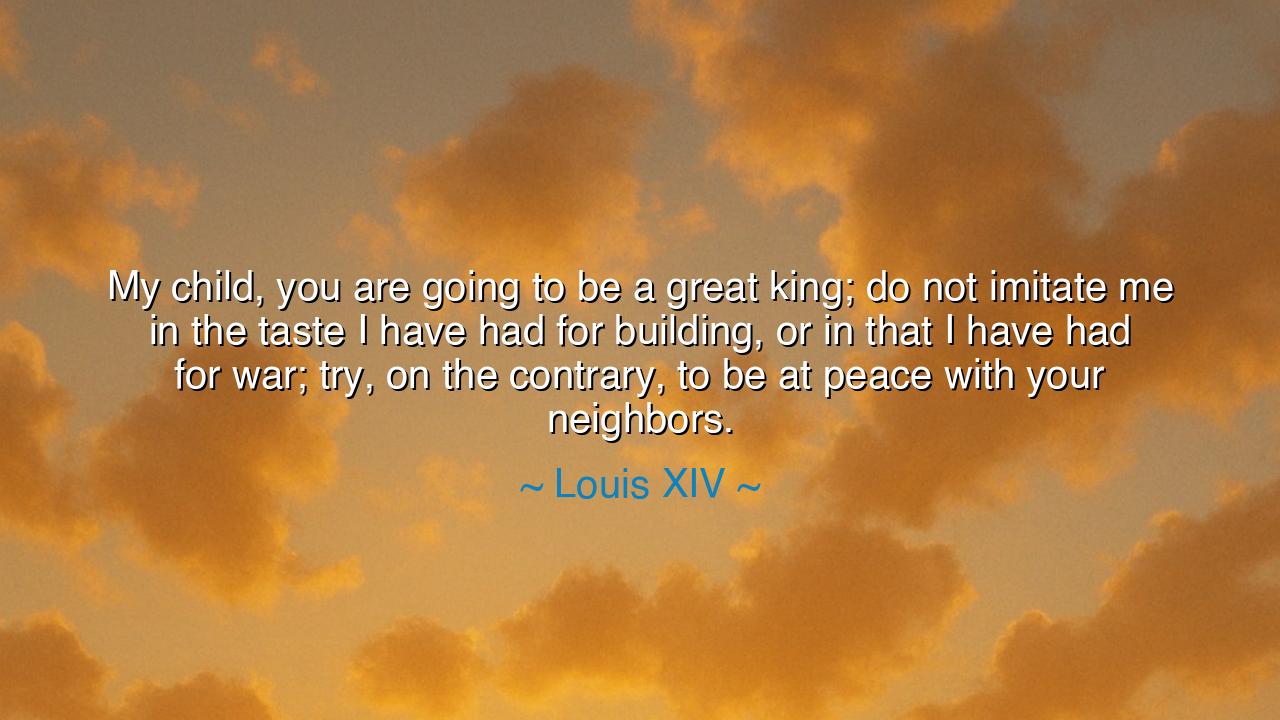
My child, you are going to be a great king; do not imitate me in
My child, you are going to be a great king; do not imitate me in the taste I have had for building, or in that I have had for war; try, on the contrary, to be at peace with your neighbors.






When Louis XIV, the Sun King of France, said to his heir, “My child, you are going to be a great king; do not imitate me in the taste I have had for building, or in that I have had for war; try, on the contrary, to be at peace with your neighbors,” he spoke not as a monarch surrounded by splendor, but as a man humbled by the weight of his own legacy. In these words, the great ruler who had dazzled Europe with the palaces of Versailles and dominated it through decades of war, confessed a truth only time and experience can teach — that the might of a king is not measured in conquests or monuments, but in peace. From the lips of one who had once believed himself the center of the world came an admission of regret, a lesson carved by years of triumph and suffering alike.
This moment, near the end of Louis’s long reign, is not the boast of a conqueror but the wisdom of a man who had seen too much glory turn to grief. The origin of his words lies in the exhaustion of France itself — a nation burdened by war, taxation, and the grandeur of its monarch’s vision. Louis XIV had ruled for more than seventy years, longer than any sovereign before him, and in his youth, he believed power to be divine and limitless. He built Versailles, a palace of such magnificence that it became a symbol of absolute monarchy. He waged wars to extend his influence, seeking to make France the sun around which all other nations revolved. Yet, as his reign drew to its twilight, the Sun King beheld the shadows his brilliance had cast — famine, debt, and countless dead. And in that moment, wisdom dawned.
His words to his son are, therefore, a confession and a blessing. “Do not imitate me,” he says, and in that plea we hear the ancient cry of all rulers who have lived long enough to see the cost of their pride. He warns against his two greatest passions — the love of building, which had turned beauty into burden, and the love of war, which had turned honor into tragedy. Yet he does not curse ambition itself; rather, he redefines it. To his son, he offers a higher calling: seek peace, for that is the truest mark of greatness. The king who once sought immortality through conquest now seeks redemption through humility.
The ancients would have recognized the nobility of this transformation. In the wisdom of the Greeks and Romans, the greatest rulers were not those who expanded empires, but those who governed themselves. Marcus Aurelius, emperor and philosopher, wrote in his meditations that the true power of a ruler lies in his mastery of anger, greed, and vanity. Louis, in his final counsel, echoed this Stoic truth. His wars had filled Europe with fear, yet his remorse revealed something rarer — self-awareness, the awakening of the spirit after the intoxication of power. Thus, the Sun King, in his final act, became a teacher not only to his heir but to all who hold authority over others.
History offers a poignant reflection of his regret. His successor, Louis XV, inherited both his grandfather’s throne and his warnings — yet ignored them. The young king, seduced by pleasure and influence, failed to heed the wisdom of restraint. The wars returned, the people suffered, and the seeds of discontent that Louis XIV had hoped to quell grew into the Revolution that would one day sweep his dynasty away. The lesson of the elder king’s final words was forgotten, and the price was paid in fire and blood. Thus do the mistakes of the fathers return when their wisdom is not remembered by their sons.
From this story, my listener, let us draw not sorrow but instruction. For Louis’s words are not for kings alone — they are for all who seek power, ambition, or greatness. Do not imitate excess. The monuments we build — whether of stone, wealth, or pride — are fleeting if they cost us peace. The true strength of a person lies not in domination, but in restraint; not in victory, but in understanding when not to fight. A heart at peace is mightier than a kingdom at war.
Therefore, take heed: build, but not for vanity; strive, but not for conquest. Seek peace with your neighbors, your rivals, and yourself, for peace is the highest form of triumph. The glory of war fades with the dying cry of its victims, but the legacy of peace endures in the laughter of generations. The wise do not seek to be suns that scorch the earth, but lights that warm it.
So remember the humility of the Sun King in his twilight hour. Greatness without mercy is ruin; power without wisdom is emptiness. Let your life, like a well-governed kingdom, be rich in understanding and guided by compassion. For in the end, as Louis XIV himself learned, no palace is greater than a peaceful heart, and no empire more enduring than the goodwill of one’s fellow man.






AAdministratorAdministrator
Welcome, honored guests. Please leave a comment, we will respond soon